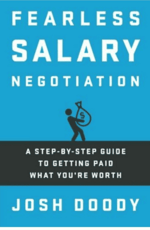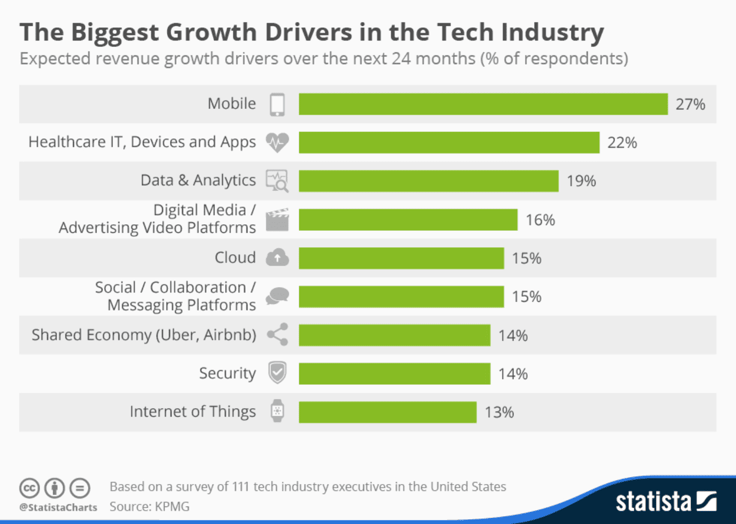
TL; DR: Salary negotiations are never easy. For many people, they’re uncomfortable, awkward, and anxiety-inducing. But Josh Doody, Founder and CEO of FearlessSalaryNegotiation, proves they don’t have to be. With a bestselling book on the art of negotiation and seven years of coaching under his belt, Josh walks us through the common fears many tech professionals experience and how to overcome them with timeless tips — no matter the job, industry, or market.
What’s the one thing that brings you dread when presented with your dream job offer? If it’s salary negotiations, you’re not alone. Asking for money has traditionally been a major faux pas, so it’s natural to feel skeptical in a business setting where you’re supposed to put your best professional foot forward.
In fact, nearly a quarter of applicants don’t negotiate their salaries because they’re scared of the consequences. And yet, almost 90% of those who did negotiate their pay received a higher salary and better benefits.
This is exactly why Josh Doody, Founder and CEO of FearlessSalaryNegotiation, dedicates his life to shedding insight into what people are most uncomfortable discussing regarding their jobs.

“There’s a lot of fear and a few things that almost everyone is always concerned about,” Josh said. “It’s a valid concern, but the flip side is it’s a business transaction, and you should remember there’s a reason a company is offering you money in the first place.”
Talking wages with a prospective employer has also been challenging for those in tech because that sector has laid off hundreds of thousands of people from tech-related jobs in 2023 alone. Still, Josh encourages tech professionals — or techxperts — to stay optimistic and never compromise on their worth.
The Most Common Fears in Negotiation

Before turning to coaching full time, Josh spent more than 10 years helping companies create performance reviews, set goals, and plan compensation.
Once he saw what was behind the curtain, he began negotiating his own salary.
Not long after, friends and family asked him for advice on how they could ask for more money from their employers or during job interviews.
Eventually, Josh wrote his book “Fearless Salary Negotiation.” After the book’s success, he decided to pursue coaching full time.
Josh has been coaching professionally for about seven years, and he says he sees the same fears over and over again:
- Fear of leaving money on the table if they don’t negotiate
- Fear that the company will get mad and rescind the job offer if they negotiate for more
- Fear of being perceived as greedy and burning bridges or getting a bad reputation
- Fear of making a bad impression on their potential manager
Josh emphasizes that these fears are common across most industries but are generally inaccurate to true life. There’s a market rate, and the point of negotiation is to help determine the appropriate market rate.
“If you were offered a job, you’re already important. It means you’re valuable to the company,” Josh emphasizes.
Even if it doesn’t work out, the experience is worth having because it will almost always make you realize the negotiation wasn’t nearly as bad as you probably expected it to be. You can walk away or accept the position knowing you didn’t leave money on the table and didn’t burn bridges.
The Art of Making Your Case for a Higher Salary
One of the most common questions Josh gets is, “When should I negotiate?”
You can negotiate anytime, but your best bet will be when you are joining an organization. Negotiating becomes more challenging once you’re already in the role.
Plus, when you’re being offered a job, there’s already an open discussion taking place. It’s a time when you can differentiate yourself from the crowd — even if you have a standard title that could have different responsibilities depending on the company, such as Software Developer or Web Developer.
Whether you’re negotiating at a new job or have been in the same place for years, here are a few tips for broaching the subject.

Remember your leverage. Many people experience imposter syndrome, so they still doubt their credibility or skill set when they get a job offer. Maybe they think the company is just desperate for a new employee or the position offered isn’t an important one. But Josh says this is rarely true.
“The fact is that when you interview, the bigger the company you’re interviewing with, the more your other people are trying to get the same type of role. And you were selected as the person they see best aligned with that role.”
View the negotiation as a collaborative process. You can approach this conversation in a way that’s more like working together rather than being on opposite sides. Chances are your interviewer is expecting it, too.
It’s also worth checking if your experience and skills can help in asking for a boost in your compensation. For example, if you’re interviewing for a web development position, you can highlight your years of web design work and explain how these skill sets overlap.
“There’s a way to have this conversation as collaborative rather than adversarial. And if you do that, there’s all upside and no downside to doing it well,” Josh says.
Ask for 10% more than they offered as an easy first counter. Josh emphasizes this is often a small amount to the company but can make a huge difference to you.
“If you ask for 10% more, it’s the easiest low-hanging fruit counter offer you can make. You were offered an important job because the company sees value in you. So if you don’t do anything else, please ask for 10%.”
The Future of Negotiation in the Tech Market
Josh’s background is in software, and he started his own SaaS (software as a service). So he is familiar with the tech climate — especially regarding employee worth and the current job market.
If you’ve worked in tech for a while, you’ve probably heard of the “Tech Recession.” But Josh doesn’t recommend letting market variables like being in a recession deter anyone from negotiating if they receive a job offer.
Despite the growing competition for tech jobs, Josh said he has noticed that individuals who have used his negotiation techniques can still effectively find work at their desired pay.
“You’re a unique person with a unique skill set. Maybe you had a minor in college that other applicants don’t have, or you have a master’s degree in a relevant field or worked in an unusual tech stack. Whatever it is, there are ways to differentiate yourself, and so it’s always worth exploring a negotiation anytime you get a job offer,” Josh says.
Layoffs in the technology sector escalated considerably in 2022 amid growing economic uncertainty. At the start of 2023, more than 150,000 employees at tech startups worldwide had been laid off during the year.
And yet, the job outlook remains positive: The US tech industry is expected to grow by 5.4% in 2023.
It may seem backward, but if you look at the big picture, the economic struggles some startups and small tech companies face aren’t the rule to the overall job outlook. Given the ever-changing nature of technology and evolving customer demands, there will always be a demand for technological progress and job opportunities.

“If you’re well-aligned with the role, you’re more likely to get the job, even amid the current market,” Josh says. “And you’ll have more ‘leverage’ to negotiate when you get that job offer.”
But Josh said he doesn’t think technology as an industry is in danger, even during economic uncertainty: “I don’t know what the outcome will be, but I do know technology is not going anywhere. It’s tough to find a company that isn’t a tech company under the hood.”
If you’ve got an upcoming job interview or are due for a raise, check out Josh’s website. That’s where you can learn more about Josh’s techniques and about his book, “Fearless Salary Negotiation.” It offers a step-by-step guide on getting a higher salary with many other helpful tips and tricks to realize your worth and never settle for less than the best.



